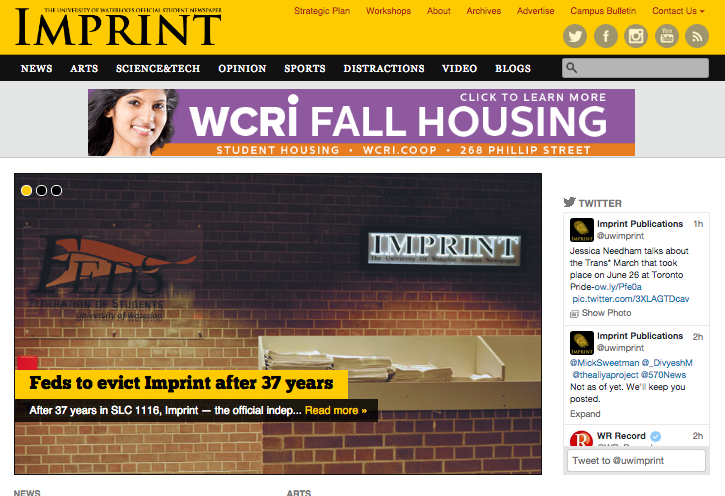In May, University of Waterloo’s Imprint newspaper received a lease termination notice from the student union for the campus office space it has published in since 1979.
[[{“fid”:”4549″,”view_mode”:”default”,”fields”:{“format”:”default”,”field_file_image_alt_text[und][0][value]”:””,”field_file_image_title_text[und][0][value]”:””},”type”:”media”,”attributes”:{“style”:”width: 401px; height: 274px; margin-left: 10px; margin-right: 10px; float: right;”,”class”:”media-element file-default”},”link_text”:null}]]By Chantal Braganza, Associate Editor
Two months ago, University of Waterloo student newspaper Imprint received a notice of lease termination from the school’s student union on the campus offices in which it had operated since 1979.
“It was a shock,” said Imprint executive editor Aliyah Kanani. “We had heard rumblings that our rent was going to be increased—but it was a shock to have it terminated completely.” According to the May 1 letter, paper will have to vacate the space by October 31 of this year.
Kanani said the notice indicated that university administration had changed the way in which office space rental fees were calculated in the school’s Student Life Centre building, and therefore charged. The building, which two years ago became the responsibility of the Federation of Students union, also houses residence and housing offices, restaurants, study rooms and a range of student services. Until now Imprint had been paying approximately $11,000 a year for 1,800 square feet of space, which included 13 computer stations, a central production table, an editorial and ad office and storage lockers for camera equipment.
“We had asked that what the new calculation was for our space, and we were given a bizarre explanation with a list of room numbers that were included as belonging to Imprint,” Kanani said. “Staircases leading to the Feds’ [Federation of Students’] offices, and a hallway that’s not even near our entryway.”
Over the next two months Kanani and Imprint’s board of directors met with the Federation to discuss what the paper’s next options were: to increase the rent by $11,000, move to another campus building or relocate to a basement office about half the size of the current one. Feeling it was at an impasse, on July 2 Imprint staff published a news article and editorial, alleging that the Federation had been unhappy with coverage it had received from the paper over the past year, and decision to relocate it was politically motivated.
The Federation has had little to say about the dispute, and declined to confirm whether any other tenant in the building had been served a similar termination. “Anything that was said in negotiation sessions, we’re obligated to keep confidential—that’s out of respect to the tenants,” said Carly McCready, vice-president of operations and finance. “Even if a tenant has decided to share it.” In the time since the Federation had taken over lease management of the building, McCready said, it had been reviewing leases as they expired, and making decisions based on a recent space audit that solicited feedback from students.
“If I can make one thing clear is that we’re not out to shut down Imprint,” she said. “The Federation thinks that the Imprint is important and we recognize their role on campus…I would think we share a lot of common goals of being in the interest of students and keeping people accountable.”
Student union and press flareups, however, are not an uncommon occurrence in post-secondary campuses. In 2013 the University of Western Ontario’s Gazette newspaper also found itself in an office space scuffle when the school’s University Students’ Council announced plans to convert the Gazette’s 1,900 square foot office into a multi-faith centre, a decision that was later reversed.
“It’s almost like a boom-bust cycle. Some years it’s really friendly and productive and positive, and others its really confrontational,” said Julian Uzielli, who worked as an online editor at the Gazette and the time, and as its editor-in-chief the year after. “The year they tried to kick us out of the space there was a strong sense in the newsroom that it was at least partially personal, because the president of the Council and our EIC did not get along.”
That same year the The Lance newspaper’s print edition was almost cancelled when the University of Windsor Students’ Alliance voted to convert paper to online-only due to an operating deficit. This was shortly after the paper ran front-page coverage highly critical of the Alliance’s most recent student election.
Over the past year, Imprint itself had reported on fees the Federation had been charging for takeout containers and a lack of transparency about meetings and minutes for the Federation’s board of directors. In the months since, said Kanani, Imprint staff had experienced a significant reduction in advertising space purchased by the Federation and an increased difficulty in contacting Federation councillors for stories. “There have been instances where we don’t hear back from interview requests for days or even a week, or where we’ve requested an in-person or phone interview, and we’ve been told we’d only get answers by email or a predetermined statement. And this is bizarre, because we’re in the same building.”
The Federation, said McCready, “is making these decisions in good faith. This new board started on May 1; it’s a brand new board except for two members, and it’s their first experience with Imprint. I don’t think there’s any bad blood.”
Regardless of the outcome, negotiations over space will have to wrap up soon, said Jesse McGinnis, chair of Imprint’s board of directors. “From our perspective, we have to have this sorted out by the beginning of August, he said. “If we’re switching spaces, we have to be in the new space by the time September rolls around.”
“There’s a lot of history in this space,” said McGinnis. “We like where we’re at. If [the Federation] just completely says no and there’s no room to work something out, that’s when we’ll start pushing harder with university administration itself.”

